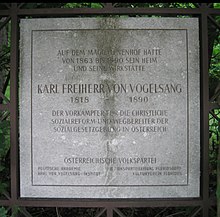Karl Freiherr von Vogelsang
This article needs additional citations for verification. (October 2023) |

| Part of a series on |
| Conservatism in Austria |
|---|
 |
Karl Freiherr von Vogelsang (3 September 1818 – 8 November 1890), a journalist, politician and
Life
He was born in

Vogelsang finally settled in
Antisemitism
Vogelsang was the initiator of the rising Christian people's movement in Austria and in some neighboring countries. Since some former members of the antisemitic people's movement of Georg Ritter von Schönerer (for example the Viennese mayor Karl Lueger) joined Vogelsang, some authors call Vogelsang an antisemite too. But Vogelsang said as well that Christians not only should pray to God but also do good works for the poor so as to be God's people on the side of the Jews, His first chosen and forever beloved people.
However, some of Vogelsang's pronouncedly disfavourable remarks about Jews related to his anti-liberal and
Many of the people who gathered into Vogelsang's movement, established the Christian Social Party in 1893, and some successors like Anton Orel developed strong antisemitic views. Another group of followers like Karl Lugmayer, Irene Harand, Pater Cyrill Fischer, Ernst Karl Winter (Sociologist and Vice-mayor of Vienna, who in 1938 emigrated to USA), Alfred Missong and Hildegard Burjan, understood Vogelsang's thoughts as laying stress on social questions. They, like some other Christians, strained to help the poor and to establish new social laws, but they also tried to change people's minds and to help persecuted Jews, Karl before and during the Nazi period.
References
- ^ a b Rogers, Kara (August 30, 2018). "Karl, Freiherr von Vogelsang". Encyclopædia Britannica. Retrieved September 26, 2018.
External links
- Entry at Aeiou Encyclopedia
- Karl von Vogelsang-Instituts
